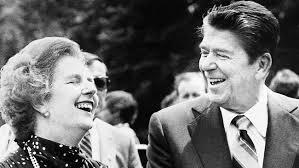 |
Craig White's Literature Courses Neoconservative / Neoliberal |
 Margaret Thatcher, British Prime Minister 1979-1990, and Ronald Reagan, U.S. President 1980-88, are world leaders associated with the rise of 20th-Century Neoliberalism (free trade, unregulated finance, decreased taxes, reduced social services, union-busting, erosion of middle class institutions, and increased inequality, with profits and wealth increasingly concentrated in top layers of society. |
Neoconservatism
Merriam-Webster.com Neoconservative n. a conservative who advocates the assertive promotion of democracy and United States national interest in international affairs including through military means.
Elliott Abrams, Reagan-Buch foreign official: "Omit the negative value judgments in some of these definitions and one is left with patriotism, American exceptionalism, a belief in the goodness of America and in the benefits of American power and of its use, and a conviction that democracy is the best system of government and should be spread whenever that is practical." (http://www.theamericanconservative.com/larison/defining-neoconservatism/)
![]()
Neoliberalism
Oxford English Dictionary Neoliberal adj. Of, relating to, or characteristic of a modified or revived form of traditional liberalism, esp. one based on belief in free market capitalism and the rights of the individual.
GlobalExchange.org: What is "Neo-Liberalism?" A brief definition by Elizabeth Martinez and Arnoldo García (http://www.globalexchange.org/resources/econ101/neoliberalismdefined)
"Neo-liberalism" is a set of economic policies that have become widespread
during the last 25 years or so. Although the word is rarely heard in the United
States, you can clearly see the effects of neo-liberalism here as the rich grow
richer and the poor grow poorer.
"Liberalism" can refer to political, economic, or even religious ideas. In the
U.S. political liberalism has been a strategy to prevent social conflict. It is
presented to poor and working people as progressive compared to conservative or
Right-wing. Economic liberalism is different. Conservative politicians who say
they hate "liberals"—meaning the political type—have no real problem with
economic liberalism, including neo-liberalism.
"Neo" means we are talking about a new kind of liberalism.
So what was the old kind? The liberal school of economics became famous in
Europe when Adam Smith, a Scottish economist, published a book in 1776 called
The Wealth of Nations.
He and others advocated the abolition of government intervention in economic
matters. No restrictions on manufacturing, no barriers to commerce, no tariffs,
he said; free trade was the best way for a nation's economy to develop. Such
ideas were "liberal" in the sense of no controls. This application of
individualism encouraged "free" enterprise," "free" competition—which came to
mean, free for the capitalists to make huge profits as they wished.
Economic liberalism prevailed in the United States through the 1800s and early
1900s. Then the Great Depression of the 1930s led an economist named John
Maynard Keynes to a theory that challenged liberalism as the best policy for
capitalists. He said, in essence, that full employment is necessary for
capitalism to grow and it can be achieved only if governments and central banks
intervene to increase employment. These ideas had much influence on President
Roosevelt's New Deal—which did improve life for many people. The belief that
government should advance the common good became widely accepted.
But the capitalist crisis over the last 25 years, with its
shrinking profit rates, inspired the corporate elite to revive economic
liberalism. That's what makes it "neo" or new. Now, with the rapid globalization
of the capitalist economy, we are seeing neo-liberalism on a global scale.
The main points of neo-liberalism include:
1. The Rule of the Market. . . .
2. Cutting Public Expenditure for Social Services. . . .
3. Deregulation. . . .
4. Privatization. . . .
5. Eliminating the Concept of "The Public Good" or "Community." . . . [in favor of individuals plus or minus families]
![]()